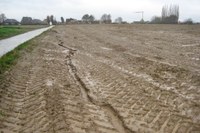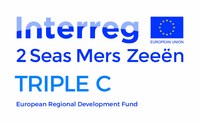TRIPLE-C prevents flooding as a result of climate change
The climate is changing. Extreme weather conditions such as drought, excessive
rainfall and floods are becoming more frequent.
Triple-C: what and why?
Floods have a great economic impact. In erosion prone areas,  this may result in erosion of agricultural parcels. The Triple-C project focuses on the catchment area of the Maarke brook in the Oudenaarde region. The project output consists of water management measures at enterprise level and erosion measures at parcel level. This is always done in consultation with local farmers. All collected data is then gathered and used to improve existing erosion models.
this may result in erosion of agricultural parcels. The Triple-C project focuses on the catchment area of the Maarke brook in the Oudenaarde region. The project output consists of water management measures at enterprise level and erosion measures at parcel level. This is always done in consultation with local farmers. All collected data is then gathered and used to improve existing erosion models.
Purpose of the Triple-C project
The three C's of Triple-C stand for Climate resilience, Catchment based and Community based. Triple C intends to make the area resistant to the changing climate, and to increase water storage in certain catchment areas taking into account the input of the agricultural community.
Triple-C in Europe
International cooperation facilitates the creation of solutions to common problems. Triple-C is a project funded by the Interreg 2 Seas programme for the UK, France, the Netherlands and Flanders. The programme is co-funded by the European Fund for Regional Development and supports projects over the period 2014-2020.
Project type : INTERREG 2 Seas Mers Zeeën
Duration : 1/07/2016 – 30/06/2020
|
Project partners | |
|---|---|
| United Kingdom
|
Somerset County Council Farming and Wildlife Advisory Group – (FWAG South West) Devon Wildlife Trust Kent County Council |
|
The Netherlands |
Brabantse Delta Waterschap ZLTO |
|
Belgium |
Vlaamse Milieumaatschappij Provincie Antwerpen Inagro ABC Eco² Provincie Oost-Vlaanderen Provinciaal Proefcentrum voor de Groenteteelt Oost-Vlaanderen vzw |


